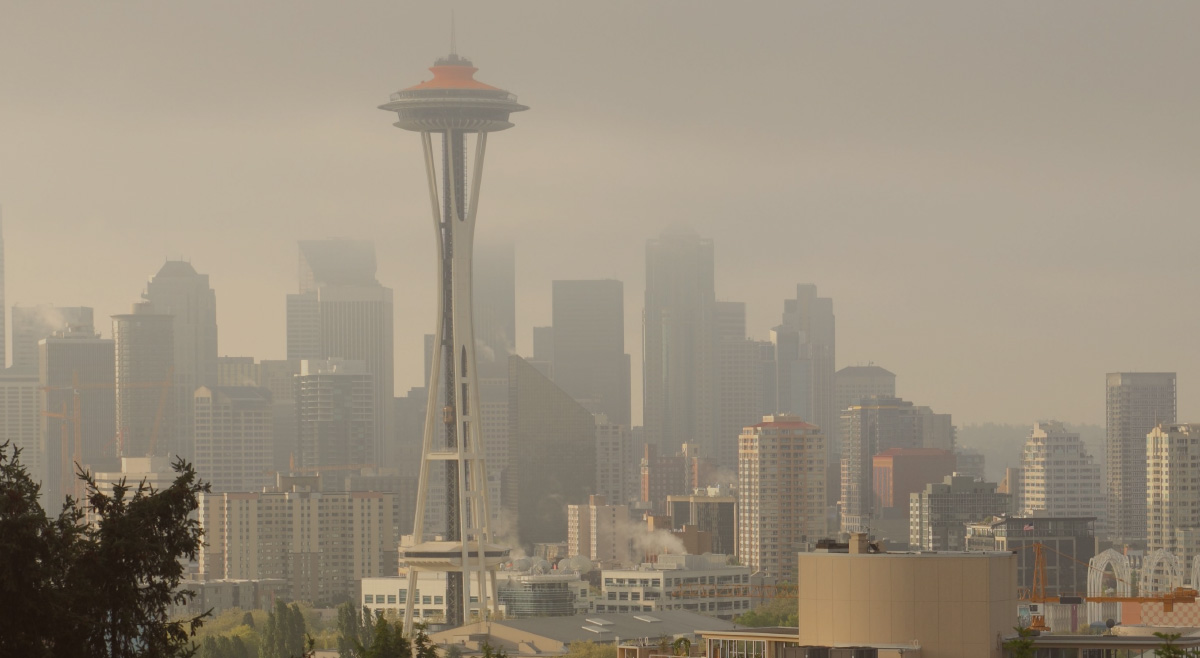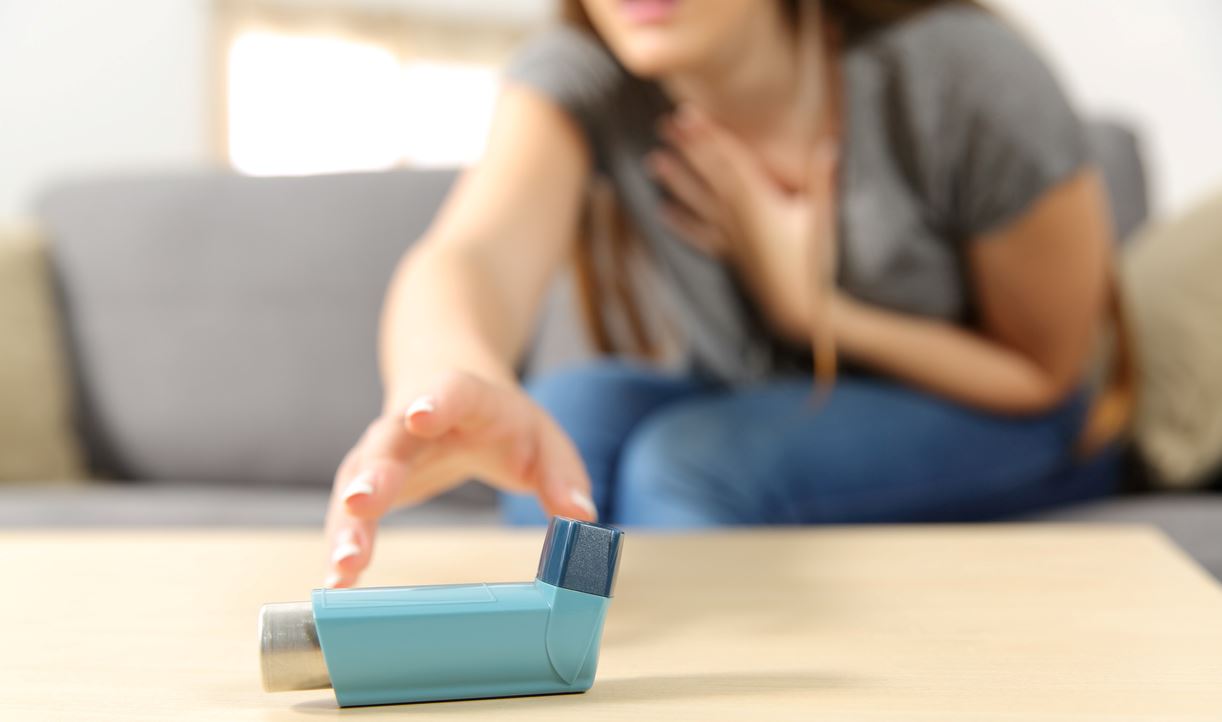
Improve Indoor Air Quality During Wildfire Smoke
As many people have noticed, the air quality is at an all time low due to the raging wildfires in Washington State. The East side of the state has been hit particularly hard and strong winds has blown the smoke into the Puget Sound area.
Scientific modeling and consensus shows poor air quality from smoke may be increasing in the near future. While the long term factors (increases in hazy skies, dirty cars and dry coughs during our summers) cannot be solved quickly, there are strategies one can use to help keep loved ones protected during these likely health hazards.
“The most important thing a person can do when air quality becomes unhealthy or hazardous is to limit exposure to the dirty air,” says Chris Baisch, HVAC & Home Performance expert at Washington Energy Services. “The notion being, when the air gets bad outside, button down the hatches inside.” The challenge with this strategy is that most homeowners in Puget Sound do not have air conditioning. Therefore they must decide between stifling indoor temperatures or opening windows for airflow relief with worse air quality.
When one has air conditioning, it is critical to keep all windows and doors closed so the AC can do its magic and keep the home comfortable. This has a double-positive effect on the air quality of the home. First, it allows the home to have a consistent barrier between outside and inside with all windows and doors closed. But, just as importantly, when your AC is running, you are also cleaning your indoor air as it cycles through the filtration system connected to the ductwork. This removes particulates and cleans the air whenever the HVAC blower fan is on. More advanced filters and cleaners can even eliminate harmful indoor air quality problems like VOC’s, mold and finer particulates.
If AC isn’t an option, there are some tactics homeowners can put into play to help themselves, “If AC isn’t in the cards, consider running the furnace fan during the summer to circulate the air inside the home.” Mr. Baisch suggests. “You don’t get the cooling and humidity reduction, but it can take the edge off the heat while cleaning the air through the filter system.”
If you suffer from allergies, asthma or other respiratory conditions, it may be wise to invest in enhanced filtering systems like HEPA filters or UV ionizers. Along with wildfire smoke, the Pacific Northwest is seeing steady annual increases in total pollen production from plants making our allergy season reliably miserable https://www.columbian.com/news/2018/jun/09/pollen-its-getting-worse/. We are seeing a trend in homeowners electing to add more robust air cleaning to their HVAC systems for these very reasons and more.
No matter what, it is wise to have a plan for poor air quality periods during the spring and summer months. We recommend having a strategy for high smoke days, high pollen days and high heat days all of which can trigger poor indoor air quality conditions.

- 2016
- AC
- AC Installation
- AC Units
- AFUE
- air conditioing
- air conditioner
- air conditioning
- air conditioning maintenance
- air conditioning service
- air conditioning tune-up
- air duct
- air duct cleaning
- air handlers
- air pollution
- Air Purification System
- air purifier
- Air Sealing
- angie's list
- award
- basement Finishing
- Bathroom remodel
- BBB
- BBB Accredited Business
- before and after
- Best air conditioner
- best filters
- best generator
- best locks
- best water heater
- best window install
- boilers
- bryant
- Bryant AC
- bryant furnace
- bryant heat pump
- christmas lights
- clean air
- clothes drive
- Clothes For Kids
- coat drive
- combi-boiler
- comfort
- community
- Construction
- contractor
- contractors
- Cooling
- Cooling equipment
- Coronavirus Protection
- custom
- daikin
- deals
- discounts
- DIY
- Donation
- Donations
- door hardware
- door installation
- door replacement
- Door Transformations
- doors
- drafty home
- drain cleaning
- Duct Cleaning
- Duct Cleaning Services
- ductless
- Ductless heat pump
- ductless heat pump. mini-split
- Ductless heat pumps
- ductless heating system
- ductless heating systems
- ductless installation
- Ducts
- earth day
- eco friendly
- EER
- election
- electrical inspection
- emergency
- energy
- energy conservation
- energy efficiency
- energy efficiency rebates
- energy efficient AC
- energy efficient air conditioner
- energy efficient home
- energy efficient hvac
- energy efficient HVAC Systems
- energy efficient windows
- energy myths
- energy saving
- energy saving home products
- energy star
- energy tax credit
- environmentally friendly
- exterior doors
- fall
- fall weather
- fiber cement
- fiberglass doors
- filter
- filter change
- financing options
- fireplace
- fireplace insert
- fireplace repair
- fireplace tune-up
- front door
- furnace
- furnace filters
- furnace install
- furnace maintenance
- furnace mileage
- furnace problems
- furnace replacement
- furnace service
- furnaces
- Garage door replacement
- gas fireplace
- gas fireplace inserts
- Gas Fireplace Makeover
- gas furnace
- generators
- going green
- good business practices
- green solutions
- Guardian Maintenance Club
- heat
- heat pump
- heat pump installation
- heat pump maintenance
- heat pump vs ac
- Heat Pumps
- heat pumps maintenance
- heat wave
- Heating
- Heating and Cooling equipment
- heating and cooling systems
- Heating Brands
- Heating Control
- Heating equipment
- Heating System Tuneup
- heatwave
- HEPA filter
- history
- holiday
- home
- home buyer
- home energy
- home energy efficiency
- Home energy efficiency solutions
- home exterior
- home heating
- home improvement
- Home Improvement Rebates
- home improvement repair
- home inspection
- home maintenance
- home maintenance checklist
- home maintence
- home performance
- home protection
- home repair
- home safety
- home upgrade trends
- home upgrades
- home value
- homeowners
- honeywell
- hot water
- hot water heater
- houzz
- how to
- HVAC
- HVAC Contractor
- HVAC Contractors
- hvac system
- IAQ
- indoor air quality
- infographic
- install
- install furnace
- insulation
- intellihot
- interior doors
- kids
- Kitchen face lift
- LED light
- LED lights
- light bulb
- light bulbs
- locks
- mailbag
- maintenance
- march
- membership
- mini-split
- modulating furnace
- money saving
- money savings
- navien
- new door installation
- new home
- New homeowner
- new windows
- news
- pacific northwest weather
- patio doors
- pets
- plumbing
- plumbing inspection
- power
- power outages
- precision tune up
- preventative
- Pro Tips
- Programmable Thermostat
- Programmable Thermostats
- propane
- PSE Award
- PSE Energy
- PUD
- Q & A
- Ratings
- rebates
- refund
- REME Halo
- Remodel
- remodeling hacks
- Replacing Heating System
- reputation
- Safe Home Insulation
- sale
- save energy
- Saving money
- scam
- scams
- seattle
- Seattle Weather
- SEER
- service
- services
- Siding
- Siding replacement
- sliding glass doors
- Smart Home
- Smart thermostat
- smoke
- Solar Attic Fan
- solar power
- Solar Powered Light Strand
- sound
- spring
- standby generators
- storm doors
- summer
- summer fires
- Summer heat
- Summer home
- super service 2016
- tank water heater
- Tank water heaters
- tankless tune ups
- tankless water heater
- tankless water heaters
- tax rebate
- thanksgiving
- Thermostat
- tips
- trends
- tune-up
- upgrade
- upgrade cooling
- upgrade heating
- utilities
- utility rebates
- veterans
- Washington Energy
- washington energy services
- water conservation
- Water Heater
- water heater installation
- water heater maintenance
- water heater repair
- water heaters
- water leak protection
- Wildfire Season
- wildfire smoke
- window
- window energy efficiency
- window install
- window maintence
- window remodel
- window repair
- window replacement
- windows
- winner
- winter
- zone heating
- Air Conditioning
- Air Purifiers
- Cooling
- Doors
- Ductless heat pump
- Environmental
- Fireplace
- Furnace
- Gas fireplace
- Generators
- Heat pump
- Heating
- Home improvement
- How to
- HVAC
- Indoor Air Quality
- Insulation
- News
- Plumbing
- Rebates
- Seattle
- Siding
- Smart Home
- Tank water heaters
- Tankless water heaters
- Tips to save money
- Uncategorized
- Wildfire Season
- Windows